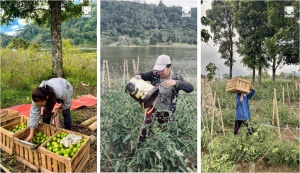
The Sustainable Livelihood Program (SLP) of the Department of Social Welfare and Development (DSWD) not only provides livelihood opportunities but also transforms the lives of its beneficiaries, an agency official said on Wednesday (February 28).
DSWD Asst. Secretary for Strategic Communications Romel Lopez pointed out that persons who used drugs (PWUDS) in Bulua town in Cagayan de Oro are given another lease on life through livelihood grants from the DSWD’s SLP.
“Initially designed to provide livelihood opportunities, the SLP also brings about positive change for individuals who seek a fresh start,” Asst. Sec. Lopez, who is also the agency spokesperson emphasized.
In October 2023, the Zero Hunger (ZH) Pigtauranan PWUD SLP Association (SLPA), which was organized by persons who once used illegal substances, was provided with Php450,000 in grants by the SLP under the Zero Hunger program.
“Through the initiative, beneficiaries are given a chance to rebuild their lives by engaging in gainful livelihood activities,” Asst. Sec. Lopez said.
The DSWD spokesperson pointed out that the SLPA celebrated on Feb. 22 a successful harvest of 15 boxes of tomatoes which are set to be delivered to the Bulua Public Market.
Under the Zero Hunger Program, Asst. Sec. Lopez said SLP Associations are connected to markets that require their produce through a Marketing Agreement (MA) signed by both parties to ensure the sustainability of the partnership.
The ZH Pigtauranan PWUD SLP Association consists of 30 members who once used illegal drugs, underwent successful rehabilitation, and are now maintaining and managing the livelihood that the government provided them.
“We believe in giving people second chances and this program has proven to be instrumental in the rehabilitation and reintegration of persons who have faced challenges related to substance use,” Asst. Sec. Lopez stressed.
Evelyn Alampayan, the local government unit (LGU) link, recounted the life of a member of the SLPA: “Diha pod nagsugod nga mag bisyo na sya, inum,cigarilyo ug uban pa. Hangtod nga naapil sya sa dili maayo nga pagpanglista sa mga naggamit ug druga”.
(The vices started with drinking alcohol, smoking cigarettes, and then he was one of those who were using drugs.)
“Ug sa dihang niabot na ang ilang funding usa sya nga napili ug nag bulontaryo nga sya ang mag mintinar niini. Sugod diha ,nabag-o ug hinay hinay ang ilang kinabuhi tungod sa iyang pagpanarbaho. Nitisok sa iyang huna huna nga iyang paningkamotan ang pag atiman niini,” Alampayan added.
(When the funding arrived, he volunteered that he would be the one to monitor the crops. From there, he slowly changed due to the role he was given. His mind was sharp and aimed to sustain the livelihood project.)
The DSWD spokesperson reiterated the agency’s commitment to empower vulnerable groups, including PWUDs, through various interventions such as sustainable livelihood.
Launched in 2011, the SLP is a capability-building program for the poor, vulnerable, and marginalized households and communities, that helps improve their socio-economic conditions through accessing and acquiring necessary assets to engage in and maintain thriving, sustainable, and resilient livelihood. #


